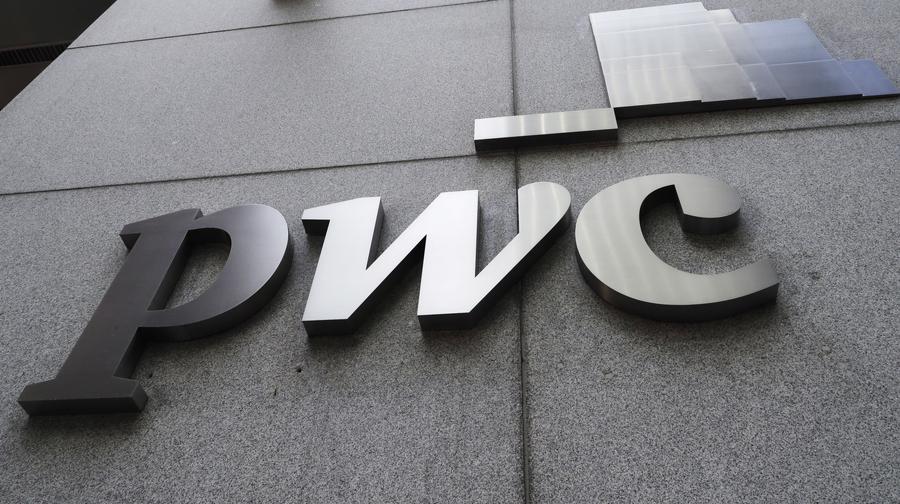 PricewaterhouseCoopers offices are shown, May 3, 2018 in New York. (MARK LENNIHAN / AP)
PricewaterhouseCoopers offices are shown, May 3, 2018 in New York. (MARK LENNIHAN / AP)
DAVOS, Switzerland - Confidence among companies in their growth prospects has dropped the most since the 2007-08 global financial crisis due to rising inflation, macroeconomic volatility and geopolitical conflicts, a survey by PricewaterhouseCoopers showed.
With 73 percent of chief executives around the world expecting global economic growth to decline over the next 12 months, this gloomy view is the most pessimistic CEOs have been since PwC began the survey more than a decade ago, it said on Monday.
The "Big Four" auditor also said that it marked a significant departure from optimistic outlooks in 2021 and 2022.
The survey also found 60 percent of CEOs do not plan to reduce the size of their workforce in the next 12 months, while 80 percent do not plan to reduce staff remuneration in order to retain talent and mitigate workforce attrition rates.
The companies that did well in 2022 are likely to see a more challenging year ahead, PwC Global Chairman Bob Moritz told the Reuters Global Markets Forum on the sidelines of the World Economic Forum's annual meeting in Davos.
Nearly 40 percent of more than 4,400 chief executives surveyed said their companies would not be economically viable over the next decade unless they innovated and transformed at a faster pace
Nearly 40 percent of more than 4,400 chief executives surveyed said their companies would not be economically viable over the next decade unless they innovated and transformed at a faster pace.
ALSO READ: KPMG and PwC: HK IPO set to regain top three position in 2022
"It is both the timeframe and magnitude that is surprising - how do I survive the next two to three years, and make my way through a challenging macroeconomic environment, while transforming my organization to be fit for growth over the next 10 years," Moritz said.
The survey also found that companies are cutting costs, even as many do not plan to reduce headcount or compensation in the fight to retain talent.
"You're starting to see some differentiation ... in terms of those (firms) that have a debt-driven balance sheet that will struggle while dealing with rising interest rates and inflationary pressures, versus those that have done a good job managing down debt and have the capacity to transform their portfolios," Moritz said.
Separately, two-thirds of private and public sector chief economists surveyed by the World Economic Forum expect a global recession in 2023.
Other highlights from the PwC survey include:
Half the CEOs reported reducing operating costs, 51 percent said they were raising prices, and 48 percent were diversifying product and service offerings.
Climate risk did not feature as prominently as a short-term risk over the next 12 months relative to other global risks.
READ MORE: ILO: Global jobs growth will halve in challenging 2023
 A participant takes a photo of people visiting the Congress Center for the World Economic Forum Annual Meeting 2023 in Davos, Switzerland, Jan 15, 2023. (LIAN YI / XINHUA)
A participant takes a photo of people visiting the Congress Center for the World Economic Forum Annual Meeting 2023 in Davos, Switzerland, Jan 15, 2023. (LIAN YI / XINHUA)
"Cooperation in a Fragmented World"
The World Economic Forum annual meeting opened on Monday in Davos, Switzerland, aiming to address divisions and fragmentation in face of multiple crises.
The manifold political, economic, and social forces are creating increased fragmentation on a global and national level, said Klaus Schwab, Founder and Executive Chairman of the WEF, ahead of the annual meeting.
Schwab stressed the need to reinforce cooperation between the government and business sectors. "At the same time there must be the recognition that economic development needs to be made more resilient, more sustainable and nobody should be left behind."
Under the theme of "Cooperation in a Fragmented World," the annual meeting will focus on solutions and public-private cooperation to tackle the world's most pressing challenges. World leaders will discuss issues including energy, climate, nature, economy, technology, society, health, and geopolitical cooperation.


